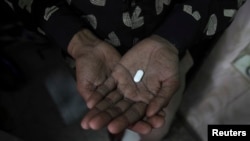The Ebola virus killed about 4,800 people in Liberia but the epidemic had other victims as well. Clinics and health services around the country shut down during the crisis as fear of Ebola transmission pushed people to stay home, creating a serious setback for the country’s fight against HIV/AIDS. Now, efforts are underway to get HIV treatment programs back on track.
One recent morning HIV patients were receiving treatment at a local Monrovia hospital.
But some were missing. The National AIDS Control Program of Liberia is still trying to track down more than 2,000 HIV-positive patients who were on its caseload before Ebola hit Liberia in March of last year.
Program manager Sonpon Blamo Sieh said they had to stop their door-to-door HIV treatment program for safety reasons as Ebola infections peaked between June and December of 2014. The government urged people to avoid contact to stop transmission of the virus.
“At that time, we had a total of 8,865 patients, can you imagine? So we lost almost pretty close to two thousand-plus patients then during the Ebola [epidemic] because people were not accessing services,” Sieh said. He said he did not know whether these patients died, whether they were lost or went somewhere to seek treatment.
Regular treatment with anti-retroviral drugs can slow the spread of HIV in the body.
‘I survived by the grace of God’
One HIV patient at the hospital who asked not to be named said he hopes things will get back to normal.
“It wasn’t easy during the Ebola period. Drugs were not reaching us. I survived by the grace of God. Some of my friends even died. We had nowhere to go for treatment.”
The Ebola crisis shut down Liberia’s entire public health sector. Sieh said that securing donor funds and support to rebuild HIV outreach has been difficult with so many other needs and all the bureaucracy involved.
He said the program also lost track of staff and volunteers, like HIV-positive mothers who were involved in peer-to-peer counseling.
“You have to now do on-site verification or a review of what was done before and see how you can strengthen those and bring new people on board, but then see how you can give them some basic training to see how they can understand adherence, confidentiality and then deal with the issue of stigma and discrimination,” Sieh said.
According to government statistics, Liberia currently has about 32,000 people living with HIV or AIDS.
Liberia was declared Ebola-free for a second time in September, but the virus has resurfaced. A teenage boy died of Ebola last week, and two of his family members have tested positive and are being treated.





